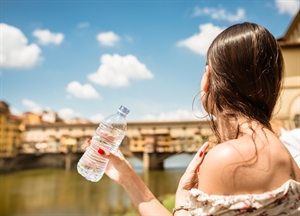Many of us travel to hot countries to enjoy all the benefits of truly hot weather – but what happens when the temperature really starts to climb? Intense heat puts the body under pressure and can leave some people with life-threatening health conditions.
Here are our tips for surviving during a heatwave.
What is the weather like at your destination?
When planning your trip, use a service like the World Meteorological Organization to get an idea of what the weather is going to be like. That way, you can pack appropriate clothing and make decisions about activity levels and acclimatization time. But sometimes the weather has other ideas! Higher than expected temperatures will make it very hard to enjoy an active vacation and you may need to manage your expectations and those of your travelling companions about how much you can realistically do on a very hot day.
Some travellers are particularly vulnerable to heat
The elderly and young children are very vulnerable to heat, as are people with an underlying health condition. If you have any of these folks in your party, look out for them, and help them to stay cool.
Dress for the heat
In very hot weather, wear loose, pale clothing made from natural fibres, sunglasses and a shady hat. Another thing you should wear during a heatwave is lots of sunscreen.
Staying cool during a heatwave
During very hot weather, plan to spend time in shady places, and avoid direct sun between 11am and 3pm. If you are walking, choose the shady side of the street. It can be tempting to go to the beach in the hottest part of the day to cool down in the water – but make sure you have some shade and bring plenty of drinking water.
What are the symptoms of dehydration?
In a climate that is hot and dry, you will need to drink more water than usual to avoid dehydration. These are some signs of dehydration:
- dizziness and headache
- tiredness
- dry eyes, lips and mouth
- passing urine less than three times a day
- urine may be dark in colour
To alleviate dehydration, drink more fluids such as water or fruit juice. But if you don’t recover in a few hours, get medical attention, as prolonged dehydration puts your life in danger.
What is heatstroke?
Spending too long in hot conditions or over exerting yourself when it is hot can cause heat exhaustion. It comes on quickly and symptoms of heat exhaustion include:
- dark urine
- faintness
- headache
- heavy sweating
- muscle cramps
- nausea
- raised pulse
- thirst
- tiredness
If you experience this, find a cool place to lie down. You can cool yourself by removing some clothing, wetting your skin and using a fan. You may also be dehydrated, so take some fluids.
It’s important to treat heat exhaustion as it can progress to heatstroke and loss of consciousness. If a patient with heat exhaustion has very painful cramps, confusion or a persistent headache, seek medical help. If they fall unconscious, put them in the recovery position and get medical help.
Tailored advice on protecting yourself during a heatwave
Periods of extreme weather – including heatwaves – are becoming more common in all parts of the world, so if you’re unsure how to cope with whatever climactic conditions you might meet on your travels, make an appointment with a travel health professional ahead of your trip abroad.

